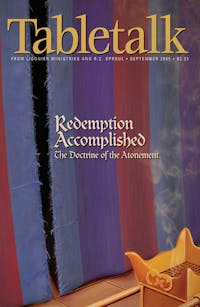
Request your free, three-month trial to Tabletalk magazine. You’ll receive the print issue monthly and gain immediate digital access to decades of archives. This trial is risk-free. No credit card required.
Try Tabletalk NowAlready receive Tabletalk magazine every month?
Verify your email address to gain unlimited access.
The notion of retributive justice — which has been the hallmark of human law since premodern times — has been under assault for many years in Western cultures. Led by utilitarian philosophers such as John Stuart Mill and Jeremy Bentham, many modern persons have determined that retribution is an unacceptable form of justice. This shift has had repercussions not only in legal practice, judicial theory, and penal law, but also in theology. For as justice has been redefined to mean rehabilitation instead of retribution, the idea of a penal substitutionary atonement has become to many persons simply unthinkable.
The most recent skirmish in this battle comes in the form of a new book by Steve Chalke and Alan Mann. Chalke is a well-known figure among British evangelicals, who has now produced a book that has ignited a firestorm in Great Britain that is almost certain to spread to the United States. In The Lost Message of Jesus (Zondervan, 2004), Chalke and Mann argue that evangelicals have misunderstood, misconstrued, and misrepresented the meaning of the cross and the doctrine of the atonement.
Chalke points to God’s love as the primary concept that should properly frame our theology. Unfortunately, his understanding of God’s love sets him at odds with any biblical notion of God’s wrath and righteousness. Specifically, Chalke suggests that a focus on God’s wrath is profoundly unhelpful in this culture, and that notions of hell, punishment, and judgment are simply out of step. He cites Jonathan Edwards’ famous sermon, “Sinners in the Hands of an Angry God,” as a particularly unfortunate message. “Preaching like Edwards’ has been all too representative of the portrayal of the gospel by the Church over the last few hundred years, and by implication, of any popular understanding of the message of Jesus,” he argues (p. 56).
Edwards, you will remember, described the predicament of the sinner as similar to a spider held over the fire. Just as that spider faces sure destruction if he is not rescued, a sinner faces sure and certain judgment and punishment if he is not redeemed. This kind of message is described by Chalke as “ferocious rhetoric” that is gladly “a thing of the past,” even though the “residue of such portrayals of the gospel” still does much damage around the world (p. 56).
Chalke’s simplistic and unfair caricature of Jonathan Edwards serves as a signal of what is to come. Later in the book, Chalke and Mann critique what they call “the myth of redemptive violence” (p. 125). This notion is drawn from postmodern theologian Walter Wink, who calls for a radical reinterpretation of the cross and its meaning. Chalke has adopted a similar program, rejecting the doctrine of penal substitution and adopting what amounts to a moral influence theory of the atonement.
According to Chalke and Mann, the cross simply serves as a profound demonstration of the love of God. On the cross, Christ “absorbed all the pain, all the suffering caused by the breakdown in our relationship with God and in doing so demonstrated the lengths to which a God who is love will go to restore it” (p. 181).
The doctrine of penal substitution — the understanding that on the cross Christ died in our place, bearing the penalty for our sin — is described as “a form of cosmic child abuse.” In their words: “The fact is that the cross isn’t a form of cosmic child abuse — a vengeful Father punishing his Son for an offence he has not even committed” (p. 182). They go further to suggest that “such a concept stands in total contradiction to the statement ‘God is love.’ ” Moreover, they argue, it is based on a “twisted version of events” that is “morally dubious and a huge barrier to faith.”
Lest their point be missed, the authors go further: “If the cross is a personal act of violence perpetuated by God towards humankind but borne by his Son, then it makes a mockery of Jesus’ own teaching to love your enemies and to refuse to repay evil with evil” (p. 182–183). Look at that statement closely. This audacious claim, so in keeping with postmodern sensibilities, directly rejects clear biblical passages that speak of God’s wrath poured out upon sin, of the necessity of Christ’s atonement, and of Christ’s atonement as a propitiation that demonstrates God to be both “just and the justifier of the one who has faith in Jesus” (Rom. 3:26).
As Chalke and Mann see it, “the cross is a symbol of love. It is a demonstration of just how far God as Father and Jesus as his Son are prepared to go to prove that love. The cross is a vivid statement of the powerlessness of love” (p. 183).
There is little new here. After all, the moral influence theory of the atonement is hardly a recent development. Nevertheless, this understanding of the cross not only falls far short of the biblical testimony; it requires a direct and unqualified rejection of the apostolic preaching. The Bible is very clear about God’s holiness, and does not flinch from warning of His wrath poured out upon sin, and upon sinners. At the same time, God’s love is demonstrated in that “while we were still sinners, Christ died for us” (Rom. 5:8). In other words, the Bible presents God’s love as a holy love — a redeeming love that is demonstrated in the atoning sacrifice accomplished by Jesus Christ.
